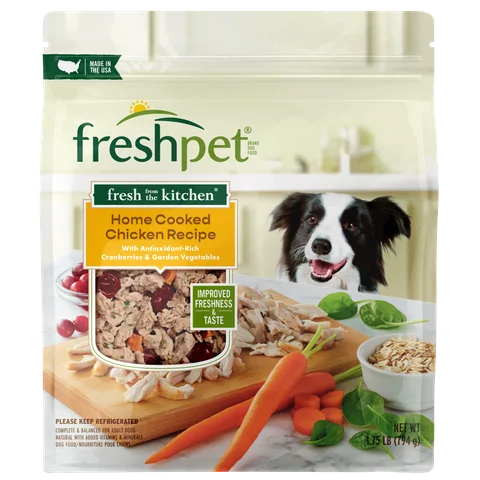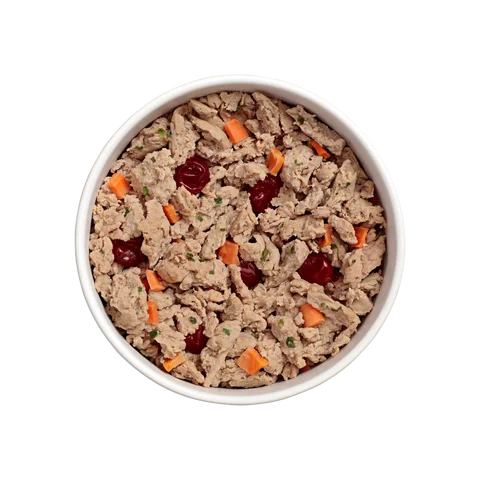


How to Improve Your Dog's Heart Health - Tips from Dr. Aziza
written by Dr. Aziza Glass
Maintaining your dog's heart health is crucial for their overall well-being and longevity. The good news is that there are steps you can take to help ensure their heart stays strong and healthy. To help demystify this complex topic, we’ve asked Freshpet vet, Dr. Aziza, to share her top tips for pet parents who want to promote their dog’s heart health.
Why is heart health so important for my dog?
Good heart health is directly connected to important organs like the brain, kidneys, intestines, liver, lungs, and more. The heart is your pet’s mechanical pump that keeps blood flowing to all the important organs every second of every minute, each day of your dog’s life. Without this action, organs will shut down. This means when your dog’s heart health is poor, it significantly impacts the quality of their life.
What can I do to promote a healthy heart?
As pet parents, there are several things you can do to enhance your dog’s heart health:
● Routine exams: Be consistent in your dog’s physical exams. Annual exams are a great way of monitoring your dog’s heart health, especially if heart disease has already been diagnosed.
● Heartworm prevention: Heartworms are a parasite transmitted by mosquitoes. As their name suggests, these parasites reproduce and live in the heart and lungs. Once infected, this disease is fatal if untreated. Thankfully, it is much easier and cost-effective to prevent, so make sure you are consistent with heartworm prevention. If your dog already has heartworm disease, contact your primary care veterinarian to see what treatment options are available.
● Great diet: Having a well-balanced, high-quality diet supports heart health. The heart is a muscle that needs proper nutrients, like protein and trace minerals found in Freshpet’s Multi-Protein Complete Meal to help its efficiency.
● Healthy weight: Like humans, a healthy weight is also good at promoting a healthy heart. Overweight patients have a higher oxygen demand and therefore create more stress on the heart.
● Monitor chronic disease: If your dog has already been diagnosed with a chronic disease like heart disease or hypothyroidism, it’s important that you continue to monitor the condition with recommended diagnostic tests. These tests will guide your veterinarian to make adjustments in medications if needed or alert them to more serious issues and concerns.
What are some signs of poor cardiovascular health and how do I address them?
Now that you have a better idea of how you can support your dog’s heart health, let’s discuss some of the signs of poor cardiovascular health and how they should be addressed:
● Exercise intolerance: Dogs with poor cardiovascular health can quickly become tired after brief play. If you are concerned about this symptom in your dog, have them evaluated by your veterinarian to see if medications are needed. Otherwise, you can build your dog’s stamina by slowly increasing the amount of controlled exercise they receive on a daily or weekly basis.
● Coughing: The heart and lungs are closely connected in function and anatomical location. Poor heart health can result in an enlarged heart leading to a cough. A cough can also indicate that the heart can not keep up with the body’s demands, causing a build-up of fluids in and/or around the lungs. This can be diagnosed with a physical exam and diagnostic tests, like radiographs.
● Lethargy: A dog that naps all the time could be lazy…or it can indicate a serious underlying disease like poor heart health. If the heart can not adequately provide oxygen to important organs, the body can be weak and falsely present as sleepy or tired.
● Pot-bellied appearance: This description is often related to a build-up of fluids in the abdomen due to poor heart health and performance. It is important for your dog to be evaluated by a veterinarian to determine why your dog has this shape.
Can poor diet and nutrition contribute to heart problems in dogs?
A poor diet can contribute to heart problems in many ways. A diet that is not well-balanced will affect the heart’s performance – don’t forget the heart is a muscle that is pumping all the time. This means that in order for it to function properly it needs enough protein and the right minerals. Diets that are high in salt, sugar, and other less-healthy ingredients will also impact the heart and your dog’s blood pressure.
This is what makes Freshpet a great choice of diet for dogs. Every recipe is made with high-quality ingredients and crafted with the support of pet nutrition experts. This means you can rest aroused knowing that your dog is getting everything they need to support their heart health.
How much does exercise directly contribute to heart health?
Like with humans, all exercise directly contributes to heart health. The heart has to provide oxygen for your body when it is burning calories. The more fit or higher the stamina, the more efficient and less strained your dog’s heart will be.
How much does exercise contribute to my dog’s heart health?
Exercise will vary depending on the age, size, and any underlying conditions your dog may have. For example, a young, healthy Dalmatian will require a different level of exercise compared to a senior, overweight Yorkie. Consult with your primary care veterinarian to determine what is the appropriate level of exercise for your dog.
Promoting your dog's heart health involves a combination of regular veterinary care, preventive measures, a nutritious diet, and appropriate exercise. By taking all of these factors into consideration, you can significantly enhance your pup’s quality of life and longevity.
















